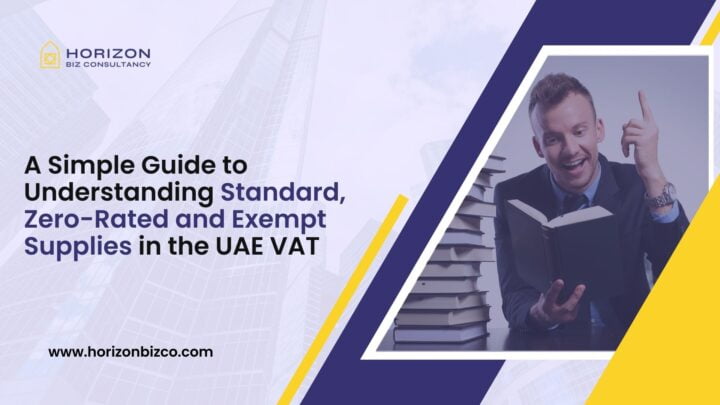VAT or value-added tax is a new tax in the UAE that can be tricky to understand. This article will explain in easy words the main types of VAT rates businesses get – standard rate, zero rate and exempt rate.
What are the Different VAT Rates?
There are three main types of VAT rates businesses need to know about:
Standard Rate – Most supplies get taxed at 5% standard rate. This means you add 5% tax to the price of goods and services.
Zero Rate – Some supplies like exports get a 0% zero rate. This means no tax gets added to the price.
Exempt Rate – A few supplies like healthcare do not pay any VAT. You cannot claim back the tax you paid on business costs.
What Gets the Standard 5% Rate?
Supplies between companies inside the UAE usually get the 5% standard rate. For example, if a cafe buys coffee from a supplier in Dubai, both add 5% VAT.
Goods moved between mainland UAE and free zones also get the standard rate. So a clothing shop paying VAT moving stock to Dubai Airport Freezone adds 5%.
What Gets the 0% Zero Rate?
Some important supplies get a 0% zero rate instead of 5% to help certain industries or activities:
- Exports of goods and services outside the UAE get a zero rate. So exporters do not pay VAT.
- Education services like private tutoring and school fees usually get a zero rate to help families.
- First sales of new residential buildings get a zero rate to help the property sector.
- Critical healthcare treatments at hospitals and clinics also get a 0% rate.
What Supplies Are Exempt?
A few supplies do not pay any VAT at all as they are exempt:
- Financial services from banks are exempt as adding VAT could raise costs.
- Local transport like buses does not pay VAT to keep ticket costs low.
- Rented homes are exempt as adding VAT to rent could push up housing costs.
- Land plots sold without a building also stay exempt when sold for the first time.
How to Know Your Supply’s Correct VAT Rate?
It is important for businesses to understand the right VAT rate for their supplies to avoid mistakes. There are a few ways to check:
- Review the UAE VAT law and guidelines on the FTA website
- Consult a trusted VAT advisor like an accountant who knows VAT rules well
- Contact the FTA directly if still unsure to get the right information
- Keep VAT invoices and records properly distinguishing standard, zero-rated and exempt supplies
Following the rules correctly helps businesses comply with their VAT obligations. An advisor can also help strategize to minimize total VAT costs.
Conclusion
Understanding the different VAT rates is an important part of VAT compliance for businesses in the UAE. Being able to correctly classify supplies as standard rated, zero rated or exempt is crucial when preparing VAT returns and accounting records. This blog post aimed to simplify and demystify the various VAT rates in plain English terms that are easy for any layperson to understand.
While the guidelines provided here cover the main aspects of each VAT rate, it’s always advisable for businesses to consult VAT advisors and experts in case of any complex or irregular supply situations. Speak to your accountant, get in touch with the FTA directly, or book a consultation with a trusted VAT consulting firm to get clarity on any borderline cases. Ensuring supplies are charged and reported under the right VAT rate mitigates risks of penalties from oversight or errors.
FAQs
No, you cannot reclaim input VAT paid on business costs if your main supplies are exempt from VAT.
Consult an advisor in case of any unclear cases. The FTA can also guide on borderline cases.
Yes, exports still get a 0% zero rate and follow export VAT rules like maintaining valid documentation.





